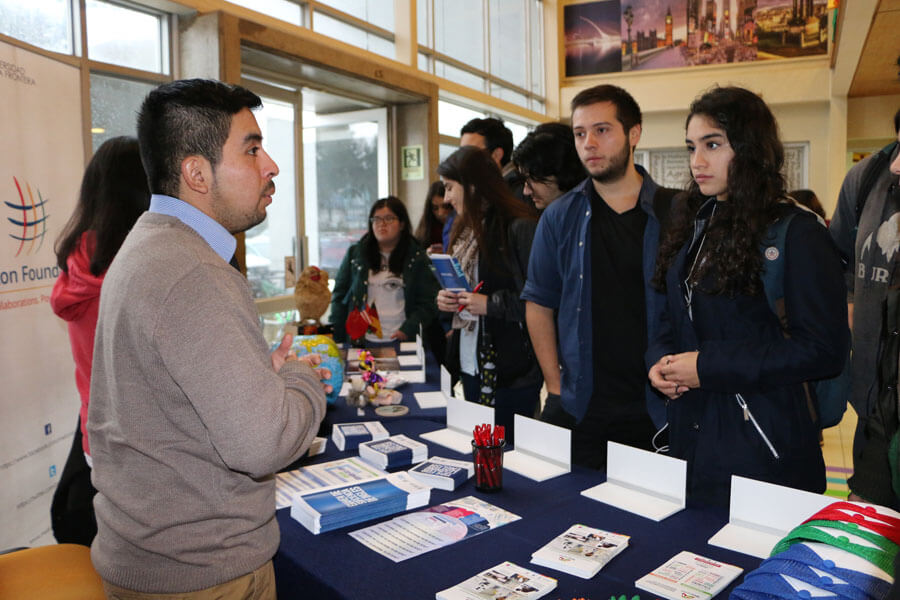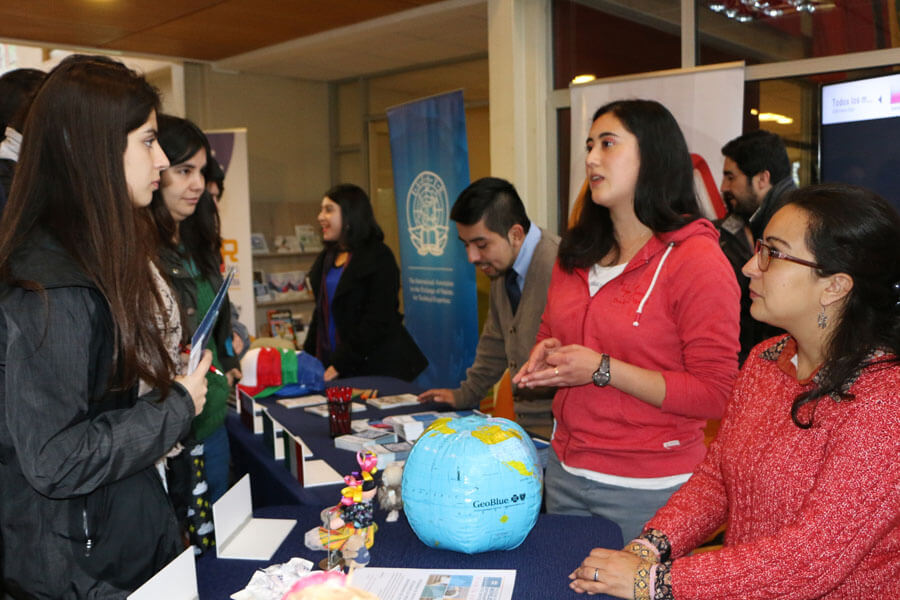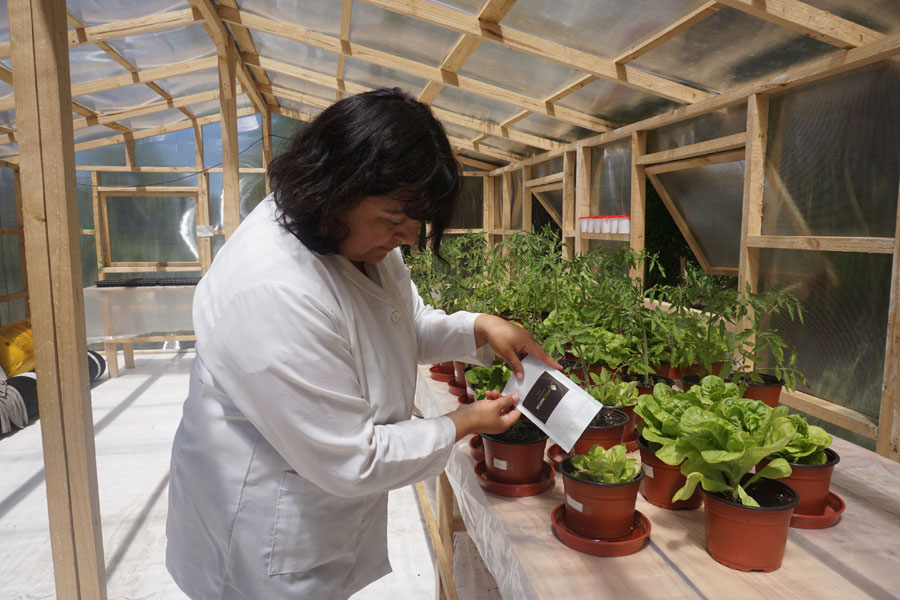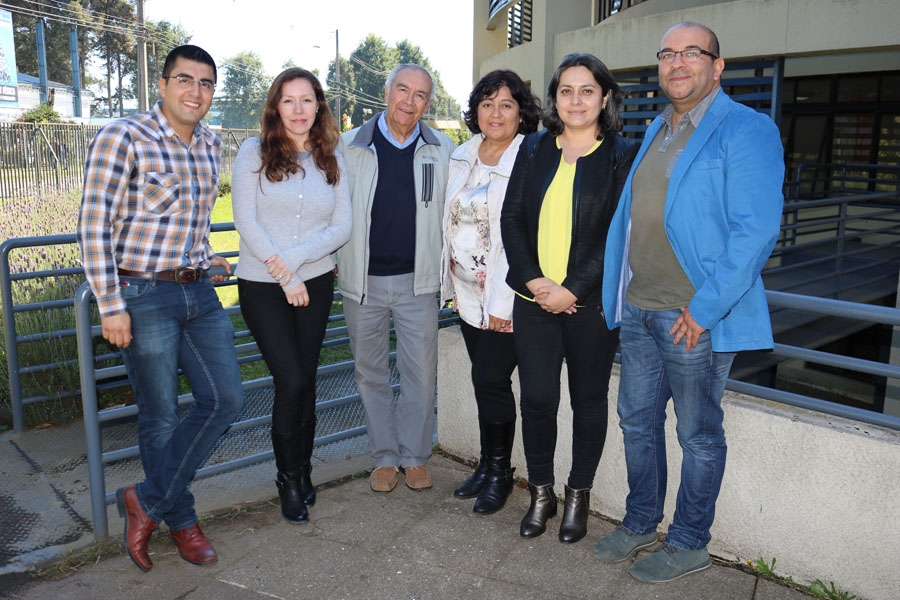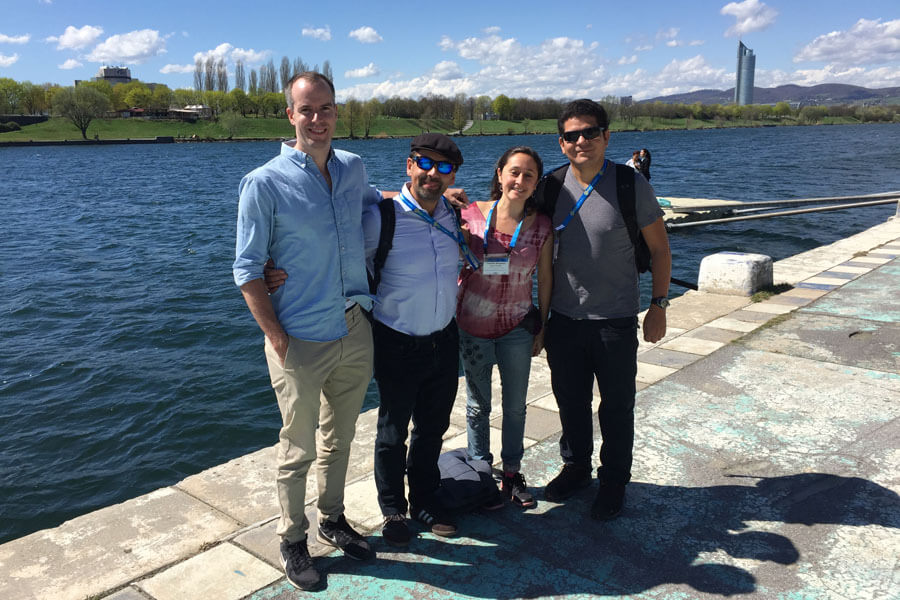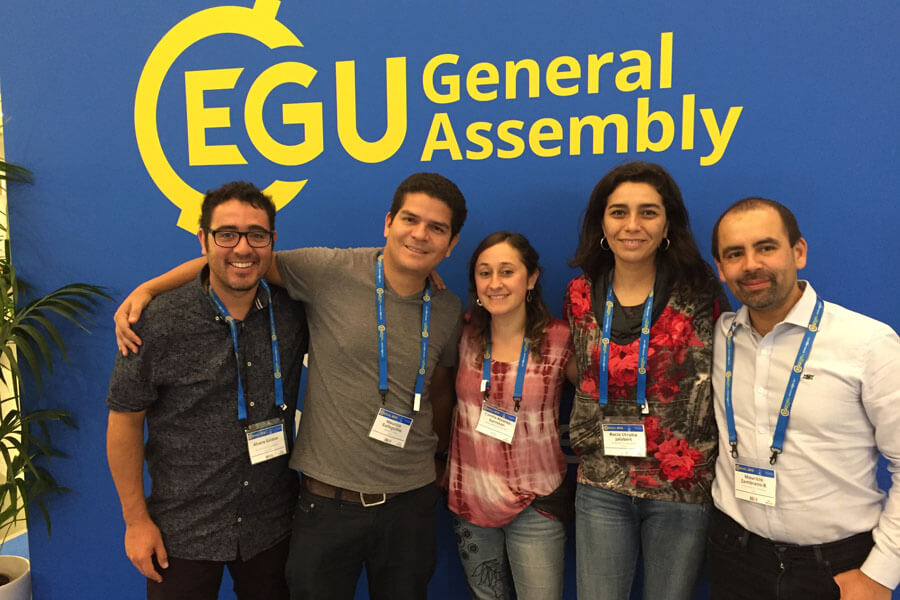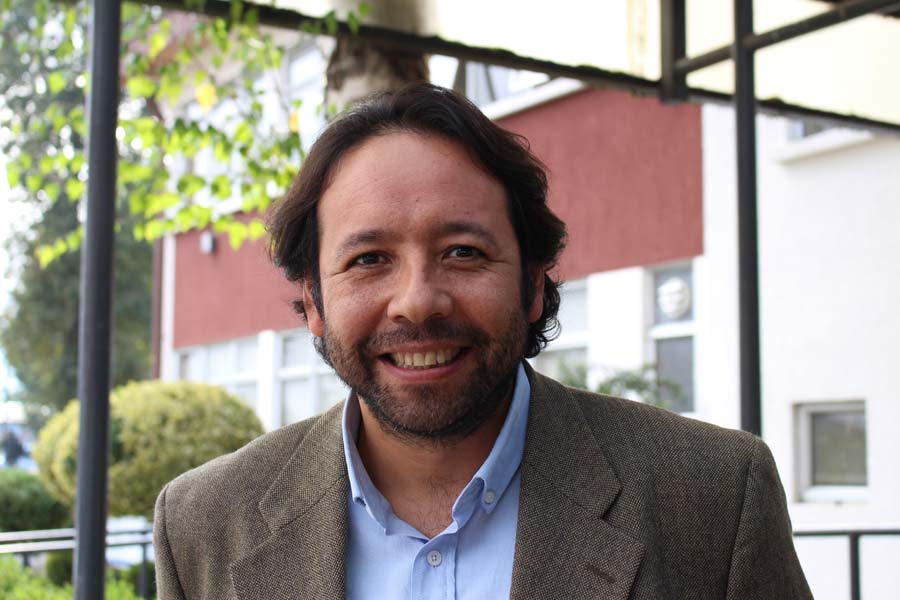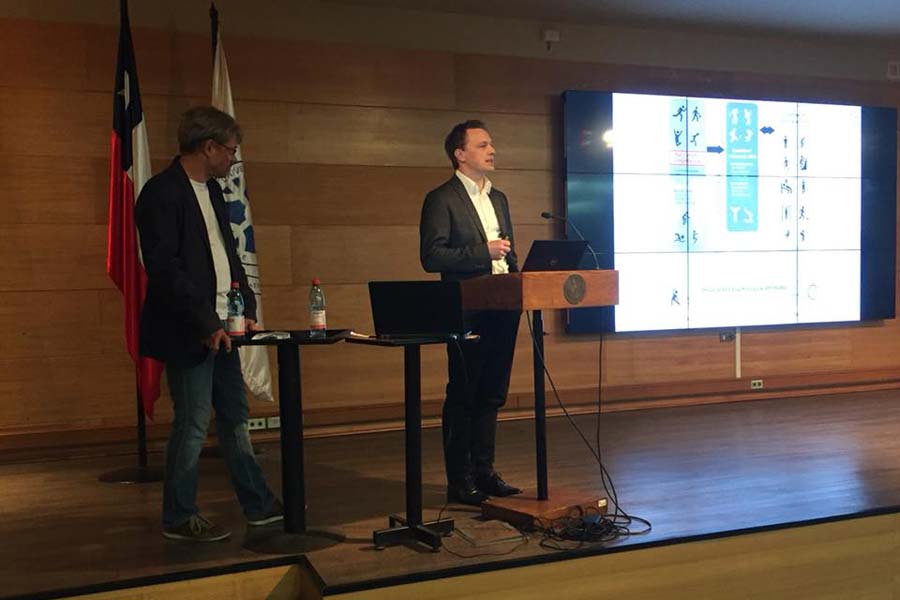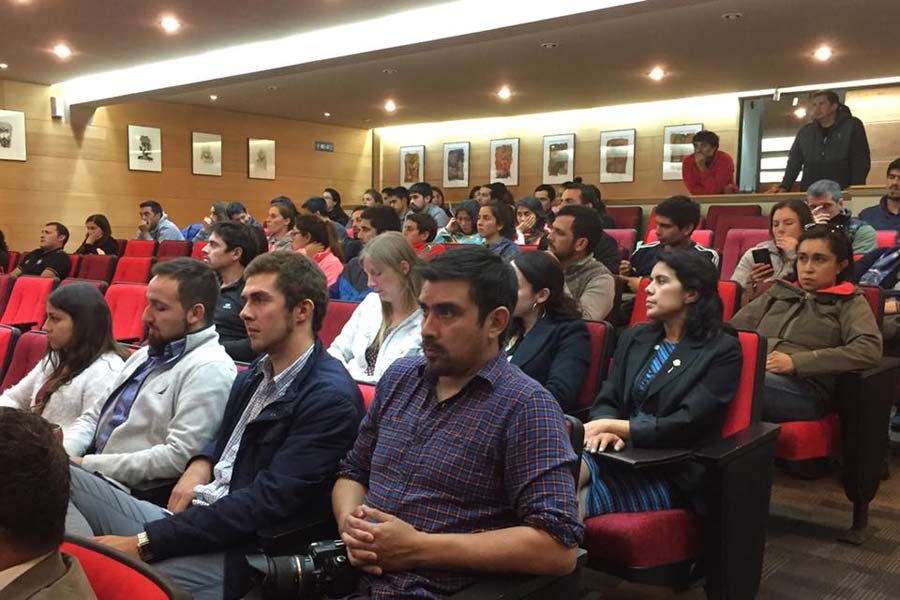|
On this occasion, the consortium officially launched English and German courses for students of the Faculty of Engineering and Science. |
Students of different study programs at the Universidad de La Frontera got to know the offer and opportunities of international mobility, employability, networking and global citizenship, etc., during the Language Exposition that was organized by the UFRO Macro Faculty of Engineering. The activity was organized with the participation of the Language Coordination Center (CODI), the International Affair´s Office, the Comprehensive Training and Employability Office (DIFEM), the Internship Unit of the Faculty of Engineering and Science, the Melton Foundation, IAESTE Chile and Temuco UniverCiudad (UniverCity). “We developed this exposition in cooperation with different units of our University and Institutions related to international student mobility, languages and international scholarships”, the executive director of the UFRO Macro Faculty of Engineering, Gonzalo Bravo, stated. “We showed our offer, so the students could clarify their doubts and express their interest in acquiring new competencies and the tools for new knowledge”, he added. On this occasion, Chilean and international students presented their experience in international mobility to the students who came to visit the exposition, which took place in the CODI Central Hall. In this regard, Guillermo Curiqueo, student in Telematics Engineering, said that “this is a very good initiative, since it is a very effective way to disseminate what is happening in our Faculty and University. I found out about the requirements to do my internship abroad, how to cover the costs and other related topics”, he said. At the same time, David Jara, student in Industrial Engineering with specialization in Computer Engineering, affirmed that “it is positive that this kind of expositions are being made, since they bring practical fields, languages and student mobility together, what gives us the opportunity to ask questions and to clarify our doubts. To count with the possibility to ask and get to know the experience of students who spent their internships, courses or semesters abroad increases the level of this activity”, he assured. ENGLISH AND GERMAN CLASSES On this occasion, the Macro Faculty of Engineering officially launched three English courses and one German course in cooperation with CODI, starting on May 2nd. The courses will be offered exclusively for students of the UFRO Macro Faculty of Engineering. “CODI develops these courses with experience and professionalism. This is why we want our students to keep improving their level of a second language”, the dean of the Faculty of Engineering and Science of the Universidad de La Frontera, Rodrigo Navia, stated. “Today, the engineering students of the UFRO live in a world where they have to know different languages, since this has a positive impact on the development of the competencies we want to promote”, he added. At the same time, the DIFEM UFRO director, Juan Méndez, emphasized the importance of learning a second language. “It is very important that we include the knowledge of other languages in the training, since it creates enormous possibilities that exist in today´s world, in which professionals can move in an uninhibited manner. English is a transversal language that brings nations together and is a tool to communicate with people from different countries. This is why it is essential that our engineers know and value the importance of this language”, he concluded. Written by: Mauricio Antivil
Engineering Project 2030 |
|
This initiative, led by Paula Aguilera, Fernando Borie and Pablo Cornejo and supported by the UFRO Technology Transfer Unit, managed to create a company and to get their technology licensed. |
The increase of the volume of water absorbed and the protection of the plant from adverse conditions are part of the benefits of the first native fungi (mycorrhizae) based inoculant product developed in Temuco, Chile, by a group of researchers of the Universidad de La Frontera. The project is led by Paula Aguilera who holds a Ph.D. in Natural Resources and the doctors Fernando Borie and Pablo Cornejo of the Department of Chemical Sciences and Natural Resources at the UFRO. The three researchers are part of the Research Center for Mycorrhizae and Agri-environmental Sustainability. Because of its technical characteristics, this bio-based product has high expectations and numerous applications, benefits different types of plants of agricultural or ornamental interest and even supports the restoration of degraded and contaminated soils. Thanks to the incorporation into the Scaling Program for Technology-based Companies that was created by the UFRO Technology Transfer Unit and IncubatecUFRO, the researchers created “MycoNativa”, a company that is responsible for the bio-based product and key in the process of its future commercialization. “In our family agriculture is an important pillar and from this point of view, we have always been interested in promoting the use of technologies that favor the environment and agricultural productivity, especially all those that can deliver quality, an added value and a better functionality to the final product”, the researcher and founder of this initiative, Paula Aguilera, explained. The production of this bio-based product, which is in its first phase, is focused on the implementation of a low-scale experimental station, for its technical validation and the beginning of commercial management. In 2017, “MycoNativa” was the only project in the Araukanía Region that obtained the Corfo (Production Development Corporation) “Capital Semilla” grant in the second call. BEGINNINGS The project, which now is directed by the “MycoNativa” company, started with a University Research Valorization call, supported and boosted by the Technology Transfer Unit at the UFRO. Through the Scaling Program for Technology-based Companies that was impulsed by the UFRO Technology Transfer Unit, “MycoNativa” has just managed to get their technology licensed. Within the next challenges is to take the production forward to the volume of a set of bio-based products which are based on these beneficial fungi and also to strengthen the area of training and services. “This Knowledge started to grow thanks to many Fondecyt (Chilean National Fund for Scientific and Technological Development) Projects in which we saw certain feasibilities in these fungi, which are the prime material of the product we present. We wanted to go beyond basic research and deliver our results. This is why the most important thing is to provide this knowledge to companies and the productive sector”, Fernando Borie said. “The participation of different units within our University has been key. Thanks to that, we were able to advance with this innovation. Research funds are not that easy to get, so we have to create a branch for product innovation and development”, Pablo Cornejo, researcher at the Research Center for Mycorrhizae and Agri-environmental Sustainability, commented.
Written by: Sergio Valenzuela
Communications Division |
|
The UFRO teacher, Dr. Mauricio Zambrano-Bigiarini, participated in this scientific event, which is considered as the most important one on Earth Sciences in Europe, and presented his study that describes the use of satellite precipitation and evapotranspiration products to assess the spatial extension, severity and duration of the megadrought that has affected the South-Center Regions of Chile. |
The academic of the Civil Engineering Department at the Universidad de La Frontera, Dr. Mauricio Zambrano-Bigiarini, participated in the Conference “European Geosciences Union (EGU) 2018” in Vienna, Austria, in order to disseminate his research studies. The scientific event is considered to be the most important one on Earth Sciences in Europe and the UFRO teacher presented his study called “Using remote sensing estimates of precipitation and evapotranspiration to assess the spatial characteristics of Chilean megadrought” that describes the use of satellite precipitation and evapotranspiration products to assess the spatial extension, severity and duration of the megadrought that affected the South-Center Regions of Chile over the past decade. The study is the result of a collaboration between Dr. Zambrano-Bigiarini and the Center for Climate and Resilience Research (CR2) of the University of Chile and follows a line of research on water and extreme events. COLLABORATION At the same time, he also participated in three other presentations in which he is actively collaborating thanks to the partnerships he has established with experts of other institutions in Chile and abroad. One of these studies is called “Assessment of water yield under global change scenarios in a mediterranean rainfed watershed dominated by exotic tree plantations” and led by Dr. Mauricio Galleguillos of the University of Chile. The purpose of this project is to investigate the effects the substitution of native forests by forest plantations has on the availability of water. Another project is called “The CAMELS-CL dataset: catchment attributes and meteorology for large sample studies–Chile dataset” and led by the postdoctoral researcher Camila Álvarez-Garrretón of the Chilean Universidad Austral. The project describes the first dataset about geomorphological and hydro-meteorological characteristics for Chile. And the third project is called “Evaluating satellite-based rainfall estimates to support low flow modelling in data scarce Andean catchments at different latitudes of Chile” and led by the researcher Alexandra Nauditt of the Technical University of Cologne, Germany. The third project addresses the use of different satellite products for the hydrological simulation of different watersheds of high socio-economic relevance for Chile. The project is the result of a collaboration between the UFRO Civil Engineering Department and the Institute for Technology and Resources Management in the Tropics and Subtropics (ITT, Cologne, Germany). REPRESENTATIVES Dr. Zambrano-Bigiarini and the researcher Camila Álvarez Garretón were the only representatives for Latin America in the "splinter meeting" of the work group "Drought in the Anthropocene" of the initiative Panta Rhei of the International Association of Hydrological Sciences, a group that is led by Anne Van Loonm, a researcher at the University of Birmingham, UK, and whose group members could collaborate with Master´s students in the study of socio-economic impacts of the megadrought in Chile. After the EGU 2018 Conference, Dr. Mauricio Zambrano-Bigiarini went to Cologne, Germany, to meet with researchers of the Technical University of Cologne to discuss the advances of their current research projects and to plan the rest of the year 2018. Escrito por: Daphne Bormann
Faculty of Engineering and Science |
|
In the latest annual meeting of the American Society for Cell Biology, the director of the Chemical Engineering Department at the UFRO, Dr. Jorge Farías Avendaño, was appointed ambassador of the society for Chile. |
Dr. Jorge Farías is a regular member of the American Society for Cell Biology (ASCB) since 2008 and the director of the Chemical Engineering Department at the Universidad de La Frontera and now assumed the role of ambassador of the ASCB in Chile. His mission is to strengthen the link between researchers and the North American Society that promotes international research collaboration in the fields of cellular and molecular biology, the training of advanced human capital and the strengthening of policies related to research. “For the University it is very important to actively participate in these activities because we can show us in an international context and that strengthens our doctoral programs, such as the Doctorate in Science with specialization in Applied Cellular and Molecular Biology and the Doctorate in Natural Resources Science, which both recently achieved international accreditation”, Dr. Jorge Farías stated. UFRO PIONEER Until the year 2017, Dr. Jorge Farías was the only UFRO researcher that has been part of this Society. He presented the recent graduate of the Doctorate in Science with specialization in Applied Cellular and Molecular Biology, Elías Figueroa, to the Society, who is now part of the ASCB in the “Young Researcher” category. Part of the requirements to enter the Society are to develop relevant research and to have publications in this thematic field. The group holds various Nobel Prizes and concentrates the main research centers of North American universities. The collaborative network and work within this Society also grew since 2017, when it established an alliance with the European version of this society, the European Molecular Biology Organization (EMBO). For this reason, Dr. Farías invites his colleagues at the Universidad de La Frontera to get to know and join this scientific Society. Written by: Daphne Bormann
Faculty of Engineering and Science |
|
The MOBAK-testing instruments are based on the basic motor competencies of schoolchildren and allow to assess them through eight test items that include “Object movement” and “Self movement”. |
The aim is to register the basic motor competencies of Chilean schoolchildren and to identify how they are related to the motivation and attitudes towards physical activity out of school. Therefore, academics of the University of Potsdam (Germany) and University of Basel (Switzerland) came to the Universidad de La Frontera for the “Conference on Pedagogic Socialization of Basic Motor Competencies in Physical Education class” and to validate the MOBAK-testing instruments in Chile. In this context, Dr. Jaime Cárcamo, an UFRO academic, commented that “considering that the development of basic motor competencies is one of the main objectives in PE class, it is important to know the impact the class has in schoolchildren, in order to determine if the objectives of the curricular bases are met and also to get to know their impact on the development of habits for an active lifestyle.” “In this context, this Fondecyt project seeks to evaluate the motor competencies in schoolchildren in 5th grade and their relation to physical activity outside of school, as well as psychosocial aspects such as the children’s attitudes and motivation. This is why we decided to use the MOBAK-testing instrument, because it is a validated instrument to assess basic motor competencies in children which is used in Europe to determine the impact of PE classes”, the Dr. Jaime Cárcamo pointed out. COOPERATION This conference was held within the framework of the Fondecyt (Chilean National Fund for Scientific and Technological Development) Project No. 11170525, “Basic motor competencies as part of the PE curriculum and the relation to motivation, enjoyment, attitudes and out-of-school physical activity in schoolchildren of the Chilean Araukanía Region”, and included presentations by the European academics Dr. Erin Gerlach (University of Potsdam) and Dr. Christian Herrmann (University of Basel), about the measurement, importance and evaluation of basic motor competencies. These topics were embedded in one large presentation which was held in German with consecutive interpretation into Spanish. “Thanks to the visit of these academics, we were able to train PE teachers and university students who are part of the team of this Fondecyt project. The application of the MOBAK-5 testing instrument will start in May and has the objective to apply the tests in Chilean schoolchildren and to determine their level of motor competencies, which they need in different situations of their in-PE-class and out-of-school activities”, Dr. Jaime Cárcamo concluded. The conference took place at the Universidad de La Frontera, in the Auditorium “Selva Saavedra”, and was sponsored by the Chilean National Fund for Scientific and Technological Development (Fondecyt Project No. 11170525) and the Universidad de La Frontera thorugh the Department of Physical Education, Sport and Recreation and the Outreach and Community Engagement Division (Extension Project EXS18-0028). Written by: María Carolina Oyarzún
UFRO School of Pedagogy |





